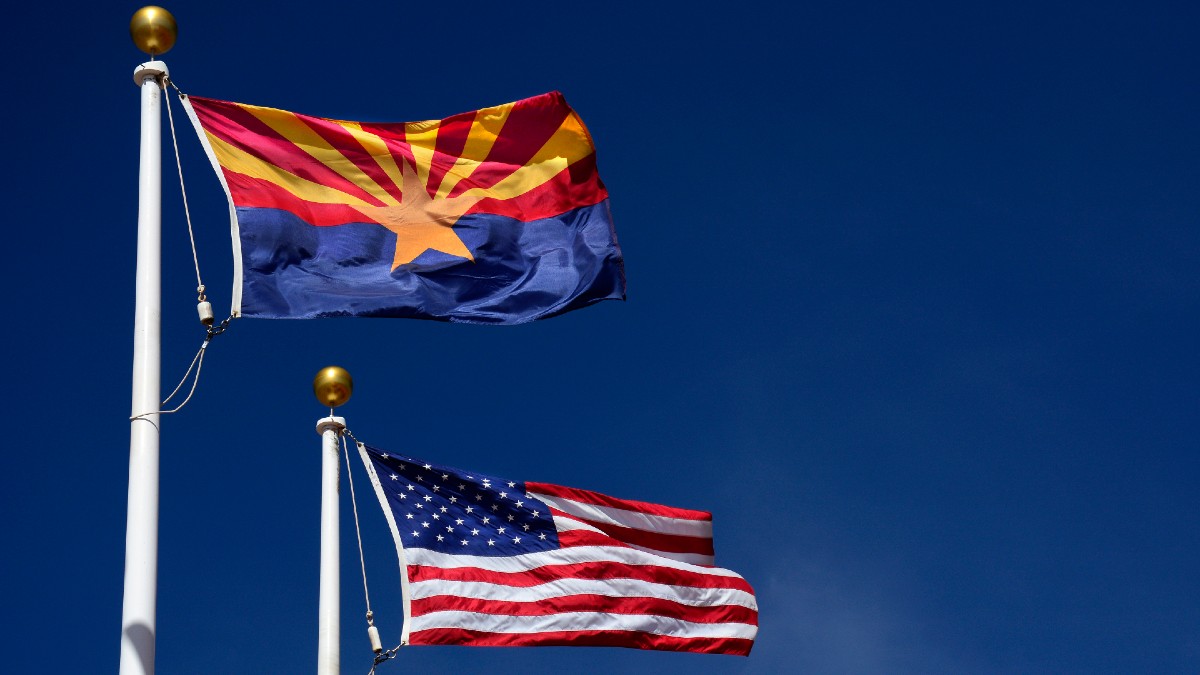Amended Arizona Sports Betting Legislation Passes Senate Committee with Historic Horse Racing Bill
Robert Alexander/Getty Images. Pictured: Arizona flag
Arizona lawmakers advanced sports betting legislation Tuesday after attaching it to a historic horse racing bill, creating a potential political minefield that jeopardizes the entire package.
The powerful Senate Appropriations Committee was set to discuss standalone historic horse racing and sports betting bills at its Tuesday's meeting. Instead, Republican Committee Chair David Gowan passed over the sports betting bill and introduced an amendment that attached the crux of the sports betting legislation to the HHR bill, which he sponsors.
Lawmakers advanced the combined bill on a 5-4, party-line vote.
Republican Sen. Kelly Townsend, who told the committee she opposes all gambling bills and was "very unlikely" to support the measure on the Senate floor, voted to advance the bill, explaining that she owned Gowan her support on the matter.
"Ordinarily, I wouldn't mind even killing this bill, based on my own convictions," Townsend said before explaining her vote, "But because I respect the chair and told him I wouldn't, I'm going to vote 'yes.'"
Gowan, along with fellow Republicans Senators Sine Kerr, David Livingston and Senate President pro tempore Vince Leach also voted yes.
Republican Sen. Michelle Ugenti-Rita, who as co-chair of the Senate Commerce Committee peppered testifiers on the original sports betting-only bill at a lengthy Commerce meeting last week, abstained from voting after opposing the legislation previously.
Democrats Lela Alston, Sean Bowie, Tony Navarrete and Lisa Otondo voted against the bill.
Bill Background
Gowan’s original bill would allow state horse tracks and off-track betting facilities to install HHR terminals. Critics such as Arizona's gaming tribes argue the games act like slot machines, which Native American groups view as a threat to their exclusive gaming rights under their existing compact and a potential roadblock to a renewed deal they're currently working through.
This threatens the delicate coalition behind the sports betting legislation, consisting of:
- 18 Arizona gaming tribes that had tentatively agreed to a renewed gaming compact. The tribes approved 10 statewide mobile licenses between them, since several groups were not interested in setting up an online sportsbook.
- Professional sports stakeholders including the Arizona Cardinals, Phoenix Coyotes, Phoenix Suns and Arizona Diamondbacks, TPC Scottsdale and Phoenix Raceway, which could all apply for a sports betting license.
- Top sportsbook brands such as BetMGM, DraftKings and FanDuel, which supported the bill and testified on its behalf.
- Doug Ducey, who championed the bill as part of the larger compact negotiations with the tribes.
Though most details have not been released publicly, the new compact would expand tribal gaming options beyond just sports betting, including a new brick-and-mortar casino in the Phoenix metro area.
Lawmakers from both parties at last week's Senate Commerce committee meeting questioned the governor’s actions behind what they considered a secretive negotiating process. Senators in the Commerce Committee further interrogated officials from the governor’s office and gaming tribes for three hours in what was supposed to be a discussion on sport betting but evolved into a wide-ranging debate on state gaming.
Ultimately, lawmakers advanced the sports betting legislation to the Appropriations Committee on a bipartisan vote, but the lengthy hearing underscored the political headwinds the stand-alone bill faced in addition to fallout from the separate HHR proposal.
The Senate's newly combined HHR and sports betting bill could also be a problem.
Unlike other committee hearings, no one from the governor's office, professional sports leagues, sportsbook operators or gaming tribes testified at Tuesday's Appropriations meeting. Senators Tuesday questioned if the HHR legislation threatened certain tribal gaming exclusivity rights and enacted the so-called "poison pill" that would invalidate the existing compact. Arizona attorney Kurt Altman said it would not, though a non-biding 2018 attorney general opinion argued it would.
When addressing his bill, Gowan said he hoped parties could find a solution that would permit historic horse racing and not invalidate the compact, though didn't give a specific path to doing so.
Next Steps
The combined bill threatens to upend months of compact negotiations.
The tribes will not support historic horse racing legislation, even if it means they can take sports bets. Though HHR proponents argue it doesn't threaten their existing compact, it could set up legal battles in the courts if historic horse racing is passed.
Sportsbook operators that backed the original bill will not support the amended version if the tribes withdraw support.
Additionally, Republican Gov. Doug Ducey has advocated for the new compact and sports betting sans the HHR bill. He could veto a joint bill should it reaches its desk, but there is still significant work to be done in the legislature.
The full Senate could hear the combined HHR-sports betting bill in the coming weeks. In the meantime, the House is set to vote on its version of the original standalone sports betting bill, which advanced out of committee with far less contention than its Senate counterpart.
Sports leagues, tribal gaming interests, sportsbook operators and the governor will now likely renew their efforts on the House bill before a full floor vote that would send it to the Senate. The standalone sports betting legislation will, again, face Gowan and other historic horse racing interests, but it gives the original bill's backers more time to work on a sports betting-only proposal that appeases all stakeholders.
Critically, sports betting backers will need to get the support of Republicans, which control both chambers of the legislature and will likely need stronger backing from Democrats than they saw in Tuesday's Approporations meeting if they have any chance of passing the bill this year.
HHR proponents testified the bill would generate $100 million in annual tax revenue, create thousands of new jobs and potentially attract new racing interests from California. Advancing the bill is a major win for the industry, but it threatens the state's best 2021 shot at sports betting — and, possibly, the far more consequential tribal gaming compact.
How would you rate this article?

